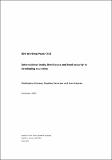| dc.contributor.author | Stevens, Christopher | |
| dc.contributor.author | Devereux, Stephen | |
| dc.contributor.author | Kennan, Jane | |
| dc.date.accessioned | 2014-06-10T15:26:11Z | |
| dc.date.available | 2014-06-10T15:26:11Z | |
| dc.date.issued | 2003 | |
| dc.identifier.citation | Stevens, C., S. Devereux & J. Kennan (2003) International trade, livelihoods and food security in developing countries. Working paper series, 215. Brighton: IDS. | en_GB |
| dc.identifier.uri | https://opendocs.ids.ac.uk/opendocs/handle/20.500.12413/4010 | |
| dc.description.abstract | Changes to multilateral trade policy should take account of their food security implications, but often this does not happen because trade negotiators and food security planners talk a different language and do not have access to appropriate data. This Working Paper explains the links between trade reform and food security, identifies the factors that need to be taken into account, and proposes an action plan for countries to establish appropriate data collection.
Since the 1980s the concept of food security has shifted away from the national to the household level, and from the production of food towards access to food. Sen’s entitlement approach, which has been associated with this shift, also provides a useful framework for assessing the effects on individual food security of national and multilateral trade policy change. But whereas food security analysts look to the production, trade, labour and transfer routes to food security, the concept at the multilateral level is much narrower, relating only to availability of imported food for net food-importing developing countries (NFIDCs). The inadequacy of the multilateral definition is illustrated by the very limited overlap between the NFIDC category and other, objective indicators of food insecurity (such as low calorie availability).
Trade negotiators should receive training in applying the livelihoods framework, in combination with the entitlements approach, to the analysis of the food security impacts of trade liberalisation at a disaggregated sub-national level. Identifying the effects of trade policy change on household food security requires both a situation analysis and a scenario analysis: the former describes the base situation before trade policy change while the latter projects the potential impact of change. But to do this data are required to identify the extent to which the entitlements of the most food insecure individuals/groups in a country are affected by the relative prices of those tradables that might be altered by trade negotiations. | en_GB |
| dc.language.iso | en | en_GB |
| dc.publisher | IDS | en_GB |
| dc.relation.ispartofseries | IDS working papers;215 | |
| dc.rights.uri | http://www.ids.ac.uk/files/dmfile/IDSOpenDocsStandardTermsOfUse.pdf | en_GB |
| dc.subject | Agriculture | en_GB |
| dc.subject | Development Policy | en_GB |
| dc.subject | Nutrition | en_GB |
| dc.subject | Trade | en_GB |
| dc.title | International trade, livelihoods and food security in developing countries | en_GB |
| dc.type | IDS Working Paper | en_GB |
| dc.rights.holder | Institute of Development Studies | en_GB |
| dc.identifier.koha | 145440 | |

